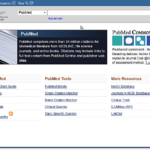 Most efforts to utilize AI and machine learning to help us digest the research literature have revolved around supporting people as they attempt to ‘drink from the fire hose’ of research coming out. With several thousand new papers every day, it’s a much needed level of support.
Most efforts to utilize AI and machine learning to help us digest the research literature have revolved around supporting people as they attempt to ‘drink from the fire hose’ of research coming out. With several thousand new papers every day, it’s a much needed level of support.
This isn’t the only use case being explored however, as a recent paper, published in PLOS Biology highlights. The paper describes the use of AI to help users as they search the PubMed database for research.
PubMed is the largest biomedical database in the world, so it’s vital that the interface is conducive to helping users get access to the literature they require.
Improving the user interface
The database consists of over 28 million article abstracts from the biomedical literature, with an estimated two new articles added every minute. The database is hugely popular, and accessed by millions of users per day. The search mechanism has largely remained unchanged from its early days however, with results displayed in chronological order. A relevance ranking mechanism was introduced in 2013, but it relied upon artificial weighting factors that required a lot of manual adjustment.
An AI-based alternative, known as Best Match, is proposed in the new paper. The system, which was introduced in June 2017, compiles relevance from dozens of signals, including a number of user engagement factors. When the system was tested, the team found that it was 20% better in terms of driving click-throughs than the standard chronological search results.
What’s more, this coincided with a higher proportion of users utilizing the relevance functionality when compiling their searches. The system is designed to improve as a result of more usage, so this increased feedback is vital to improving the system.
“Overall, the new Best-Match algorithm shows a significant improvement in finding relevant information over the default time order in PubMed,” the team explain. “We encourage PubMed users to try this new relevance search and provide input to help us continue to improve the ranking method.”